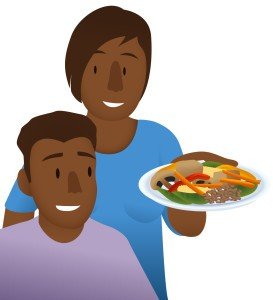Feeding a Teen Vegetarian in 3 Steps
 As kids stake claims to their independence when it comes to eating, more tweens and teens are experimenting with vegetarian and vegan diets. Parents may be concerned that their children are undernourished when adopting these eating patterns, but they can rest easy. Kids can thrive on plant-based diets. All parents need are these 3 steps for feeding a tween or teen vegetarian…
As kids stake claims to their independence when it comes to eating, more tweens and teens are experimenting with vegetarian and vegan diets. Parents may be concerned that their children are undernourished when adopting these eating patterns, but they can rest easy. Kids can thrive on plant-based diets. All parents need are these 3 steps for feeding a tween or teen vegetarian…
- Go dense. When teens switch to a plant-based diet, it’s important to make sure they get enough protein, calcium, iron, zinc, and vitamin B12. These nutrients are in abundance in animal products. A nutrient-dense diet, filled with a variety of unrefined grains, fruits, vegetables, legumes, nuts, seeds, oils, and meat alternatives like fermented soy products, can provide tweens and teens with everything they need from food. In some cases, kids who have adopted vegetarian or vegan eating habits may require vitamin supplementation, so be sure to let their physician know about their change in diet.
- Don’t worry about combining. Eating a vegetarian or vegan diet has gotten easier thanks to recent research. It turns out that combining protein and grain foods at each meal — a tedious process for new vegetarians — is no longer necessary. As long as kids get the minimum servings from each food group every day, their bodies will do the combining for them!
- Know the minimums. Teens should eat at least the minimum servings from each food group. This means 6-7 servings of whole grains, 2 servings of legumes, 1 serving of nuts and seeds, 3 servings of fats and oils, 5 fruits and 5 vegetables, along with 3-4 servings of dairy or dairy alternatives. This may look like an exorbitant amount of food, but when you consider the actual size of a serving, it sounds a lot more reasonable. If you need a reference for serving sizes, head over to the post Be a Serving Size Sleuth for help.
If your teen or tween wants to become a vegetarian, make sure that he or she understands how food fuels growth, the body, and the brain, every day. Once they have that knowledge, they will be ready to spread their (meatless) wings and thrive with a plant-based diet.By Beth Rosen, MS, RD, CDN


